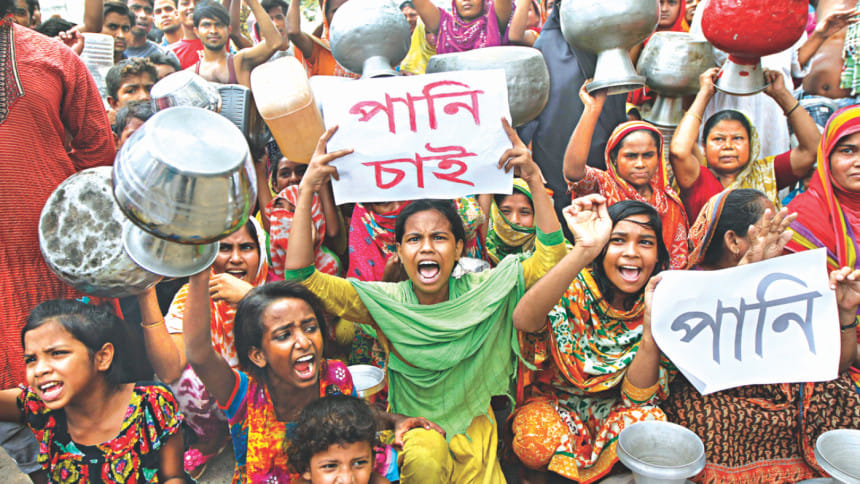Water crisis all around Dhaka

As soon as the clock strikes midnight, Shahreen Noor wakes up.
Hurriedly, the resident of the capital's Uttara (sector-14) fetches empty containers and puts them underneath water taps and waits patiently.
“This has been going on for the last five days. We're not getting any water the entire day,” said Shahreen who lives on Road-17 in the area. “It's only at night we get water, but that is too insufficient.”
“The situation is awful. Can you imagine how badly this has affected our lives, especially during Ramadan?” she told this correspondent.
She said the caretaker of the building has been spending almost the entire night trying to fetch water for the tenants.
But the supply was so little for the last couple of days that he could hardly get a bucket full of water.
Shahreen said they even bought water from the water supply trucks of Wasa (Water Supply and Sewerage Authority). “It was still not enough.”
Many of the residents have spoken to the Wasa authorities regarding the issue but to no avail, she alleged.
"We want a solution," she said.
Like Shahreen, residents of parts of Banasree, Kaderabad Housing, Katasur, Dakkhin Khan, Kalshi of Mirpur, Uttar Khan, Shekhertek, Mirpur-1, Agamasi Lane, East Jurain, Madhubagh and Madhya Badda have been suffering from severe water crises for the last one to two weeks.
The crisis intensified at Mirhazirbagh in Jatrabari, where residents are facing an acute water crisis for the last couple of months. Their sufferings intensified during Ramadan.
Out of frustration, some of the residents yesterday demonstrated blocking a road in the area for an hour, demanding supply of water. They were holding empty buckets and jars symbolising the water scarcity they were facing.
According to Wasa sources, the ongoing load shedding, depletion of ground water and equipment malfunction of deep tube wells are the main reasons behind the crisis.
Meantime, the water crisis in Kakrail also intensified.
Lily Costa, a resident of the area, said they have been suffering from a shortage of water for the last two months. “Every night we stay up late to collect water. If we are lucky, we get water for 30 minutes at best,” she said.
Lily said a few building owners installed deep tube wells, which provide some relief to the residents. “But those without access to the deep tube wells are the worst sufferers.”
Even Wasa's water carrying trucks are not available all the time, she said. “In every three days, such trucks will show up in the area and people will rush to get water from it.”
Lily said they have also contacted the Wasa water suppliers. They said as water from the trucks is in high demand, they cannot supply it on a regular basis.
“With viral fever all around and this scorching hot weather, the water shortage has made our lives miserable,” she said.
Meanwhile, residents of Shewrapara are also hit hard by the water crisis. Many of them alleged that the price of water they buy from Wasa went up due to the huge demand.
“We've been purchasing water jars at Tk 60 each though the price was Tk 50 just two days back,” said Shaheen, a local.
Also, several hundred residents at Mirpur section-6 are not getting sufficient water from the Wasa supply lines for the last one month.
“We have been facing the water crisis since the installation of new lines,” said KM Moshiur Rahman, a resident of Mirpur-6. He said in the last one month they did not get any water except for a week.
Contacted, Managing Director of Dhaka Wasa Taqsem A Khan said, “In general, during dry seasons, problems arise in some areas since the deep tube wells malfunction. Also, load shedding and declining water level are the other reasons behind the water shortage.”
But there has been no reduction in the water production, he said.
He, however, said people are facing water crises in some areas.
The water crisis at sector 11 and 14 in Uttara occurred due to load shedding, which disrupted the water supply system in the areas, he added.
“We're trying to solve the crisis,” said Wasa MD. “We are supplying water through the water trucks or if needed rationing the supply,” he said.

 For all latest news, follow The Daily Star's Google News channel.
For all latest news, follow The Daily Star's Google News channel. 



Comments